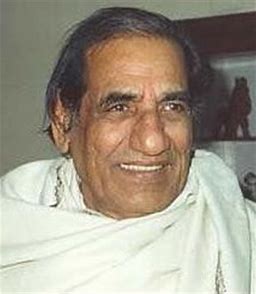Shri. Sita Ram Goel ji : The Intellectual Kshatriya

Shri. Sita Ram Goel ji (16th October 1921 – 3rd December 2003) was an Indian historian, religious and political activist, writer, and publisher known for his influential contributions to literature pertaining to Hinduism and Hindu Nationalism in the late 20th Century. He had Left leanings during the 1940s, but later became an outspoken anti-Communist. He also wrote extensively on the damage to Bharatiya culture and heritage wrought by Nehruism.
Goel ji has been described by Dr Koenraad Elst as an ‘Intellectual Kshatriya’. Dr David Frawley said about Goel ji that he was ‘modern India’s greatest Intellectual Kshatriya’, and ‘one of India’s most important thinkers in the post-independence era’.
According to Dr David Frawley, “Sitaram followed a strong rationalistic point of view that did not compromise the truth even for politeness sake. His intellectual rigor is quite unparalleled in Hindu circles. It is a testament to his capabilities that it will be extremely difficult if not entirely impossible to find a single Hindutva supporter on social media today, and especially among the youth, who has not been influenced one way or the other by the works of the great Goel.
‘Hindu Temples – What happened to them’ perhaps remains Goel’s best-known work. In the book, he documented, with his co-authors such as Arun Shourie and Ram Swarup, the catastrophic damage that was inflicted on the Hindu civilization and its Temples by the Muslim invaders.
Then there was his book ‘Hindu Society Under Siege’ where he writes – “Thus Hindu society not only presents itself as a prey to these exclusive, intolerant and imperialist ideologies but also acts as a buffer between them. India is secular because India is Hindu. It can be added as a corollary that India is a Democracy also because India is Hindu. If Hindu society permits this free for all any further, the days of Secularism and Democracy in this country are numbered. Let the Hindus unite and save themselves, their democratic polity, their secular state, and their Sanatan Dharma for a new cycle of civilization, not only for themselves but also the world”.
Goel ji was particularly sharp in his criticism of Christian missionaries. He wrote of them in his book, Catholic Ashrams – “Fundamentalism is as foreign to Hinduism as honesty is to Christian missions”. True to his pagan roots, Goel was critical of both Christianity and Islam. In another book that he co-authored, he wrote – “Ascribing human brotherhood, social justice, world peace, self-sacrifice and compassion to Christianity and Islam is tantamount to proclaiming that the wolf is a votary of vegetarianism”.
In 1986, Goel ji reprinted Colin Maine’s essay ‘The Dead Hand of Islam’. Some Muslims filed a criminal case against Goelj ji, alleging that it violated Sections 153A and 295A of the Indian Penal Code and similar articles of the Indian Customs Act.
The judge discharged Goel ji and referred to the earlier court precedent ‘1983 CrLJ 1446’. Speaking of the importance of that precedent, the judge in his discussion said : “If such a contention is accepted, a day will come when that part of history which is unpalatable to a particular religion will have to be kept in cold storage on the pretext that the publication of such history would constitute an offence punishable under S-153A of the Penal Code. The scope of S-153A cannot be enlarged to such an extent with a view to thwart history. (…) Otherwise, the position will be very precarious. A Nation will have to forget its own history and in due course the Nation will have no history at all. (…) If anybody intends to extinguish the history (by prohibiting its publication) of the Nation on the pretext of taking action under the above sections, his act will have to be treated as malafide one.
On his Death Anniversary (3rd December), we pay our obeisance and respects to this great soldier of Hindu Dharma.
| India is secular because India is Hindu. It can be added that India is a Democracy also because India is Hindu ! |